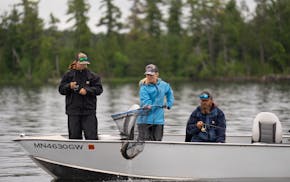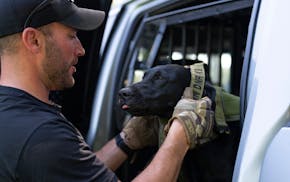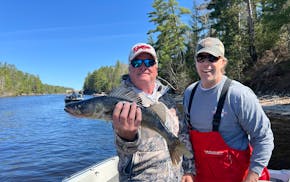Drew Swartz has been in school a long time. First in Missouri for his undergraduate degree, then in Minnesota for a master's. Now he'll finish his doctorate this summer at the U, studying veterinary population medicine.
Obviously a smart guy, Drew, 25, humored me the other day when I gave him a pop quiz.
If a Minnesotan, I asked, spends $1,000 or more to outfit themselves for the state's Nov. 9 whitetail opener, is that person more or less likely to a) have fun, and b) bag a deer than someone who buys or borrows gear worth a fraction of that amount?
"I don't necessarily think you need all of the best gear to go hunting and have fun, to be honest," Drew said. "Or to shoot a deer."
I agree.
The question is important because in the United States there are about 11.5 million deer and other big-game hunters, compared to only 5.3 million Americans who chase small game and 2.8 million who hunt ducks and geese, according to the latest Fish and Wildlife Service survey.
Of these, about 450,000 Minnesotans hunt whitetails, by far the most of any of the state's hunting types.
Keeping these hunters active and purchasing licenses, while also recruiting new hunters, is critical, experts say, to maintain habitats for these and other species and to pay for their management by the Department of Natural Resources and other agencies.
But high gear and clothing costs can keep some prospective hunters on the couch. In 2022, hunters nationwide spent almost $20 billion on equipment. Of that amount, $9.6 billion, or about half, was ponied up for rifles, scopes and ammunition.
Additionally, big-game hunters in 2022 each spent about $900 in trip-related expenses over an average of 12 days in the field.
On a university student's budget, Drew couldn't afford those costs when he moved to Minnesota in 2020.
"Obviously, that was during the pandemic, so there wasn't much going on," he said. "But eventually, I decided to go to a bar to see if I could meet some people. That's how I ran into a guy who fished and also hunted. Eventually I met his friends, too, and they encouraged me to join them. I had hunted as a kid in Pennsylvania with my dad. But I didn't have any equipment in Minnesota."
So it was two years ago, when Drew first hunted deer as a Minnesotan, he did so with other people's stuff.
"That's not completely true, I did have my own jeans and sweatshirt," he said. "But my friend loaned me his orange jacket and even loaned me his boots. I ended up shooting a doe on a state wildlife management area in southeast Minnesota. It was great."
But would it have been even greater if, before the hunt, he had gone to a sporting goods store and dropped a grand or two on a new gun, waterproof boots, synthetic base layers and the snazziest Gore-Tex jacket and pants?
Not necessarily, Drew said.
Again, I agree.
The truth is, for 90% of Minnesota deer hunting, clothing need only serve three purposes. To keep its wearer dry, warm and visible to other hunters.
The rest, for the most part, is bells and whistles.
True, if you're a mountain hunter, or active in other extreme environments, the best stuff from Stone Glacier, Kuiu, Sitka, First Lite and similar outfits can be a requirement, not an option.
Otherwise you might sweat too much hiking uphill or while packing out game, or not have enough protection in case of storms or other extreme weather.
Quality equipment also lasts longer, and usually provides more warmth with less weight.
But for many outdoor activities, including deer hunting, Minnesotans can get by with less. Used clothing and other outdoor gear is often available on Facebook Marketplace and other online sites. Goodwill and similar retailers are worth a try. And it's possible that Nancy Ford, who owns a used outdoor clothing and gear repair shop in Minneapolis called Repair Lair where she sells reconditioned outdoor clothing at a relative bargain, might have something that will work.
"There are a lot of ways to experience the outdoors, and you don't necessarily have to do it the way today's clothing and equipment manufacturers are dictating," she said.
Kevin Doran would agree.
He's another Minnesotan who found himself looking for clothing and other gear after deciding to take up deer hunting as an adult.
A Brainerd native, Kevin left the state in 1993 to "chase work," before moving to the Twin Cities in 2015 to anchor the news at KSTP-TV.
"Growing up in Brainerd, I hunted more ducks and grouse than deer," he said. "Then, when I came to work at KSTP, my brother Mike had been hunting deer for some time, so I started, too. But I didn't have a gun or any clothing."
Fortunately, his birthday is in November. So his brother and his dad, who has since passed away, took him to a sporting goods store, where as a gift they dressed him in blaze orange.
"And my dad gave me his .308 to use," he said.
A similar outfitting process ensued four years ago when Kevin's wife, Teresa, decided to try deer hunting.
"At first, just about everything she used was handed down, to see if she liked deer hunting, before we bought things she would need," Kevin said. "Now she has her own blaze orange jacket. And she wears my dad's bibs, because she loves the idea of wearing something he wore when he hunted. And my brother lets her use his .243."
Drew and Kevin took different paths to become deer hunters and to be outfitted as such. But they now share with each other, and with 450,000 other Minnesotans, the keen anticipation that advances the season's first day, and are eager to see what occurs when the sun rises that morning.
"Last year, on the wildlife management area where I hunt, I saw a nice buck and would have had a shot, but I spooked him. So that was a learning experience," Drew said. "This year on the opener, maybe I'll see him again."
Said Kevin:
"I'll finish our newscast at 10:30 Friday night before the opener, and my wife and I will leave then for up north.
"My brother brings his fish house, and my wife and I will sleep in it that night, so we'll wake up right where we hunt. I absolutely love it."

Anderson: In early June, Minnesota fish are begging to be caught. Won't you help?

Anderson: Tails wagging, DNR officers' dogs find lost people and missing evidence
Anderson: Punish poachers more
Anderson: The Chainsaw Sisters Saloon is gone, but the Echo Trail is still a pathway to possibilities


